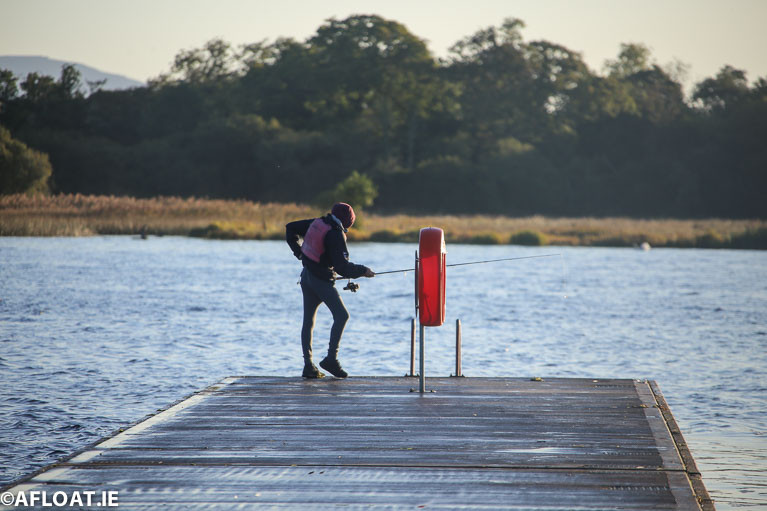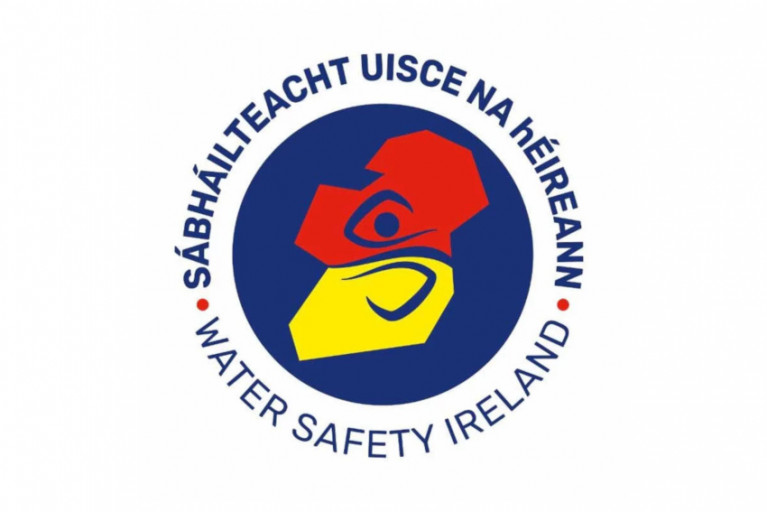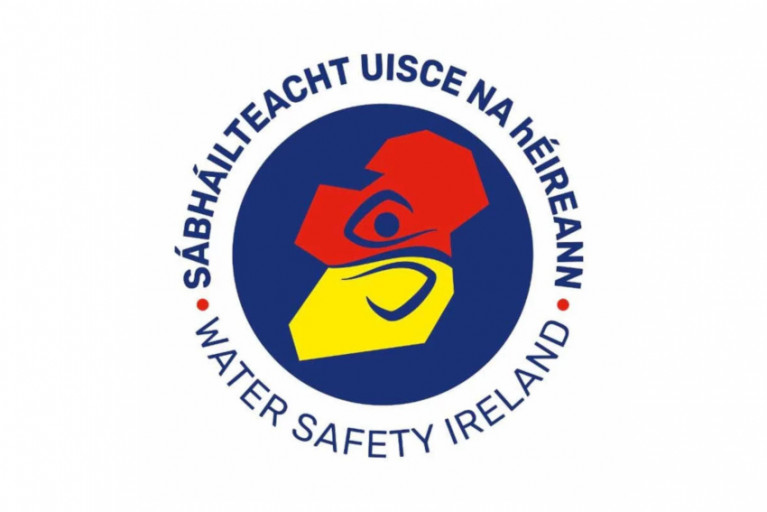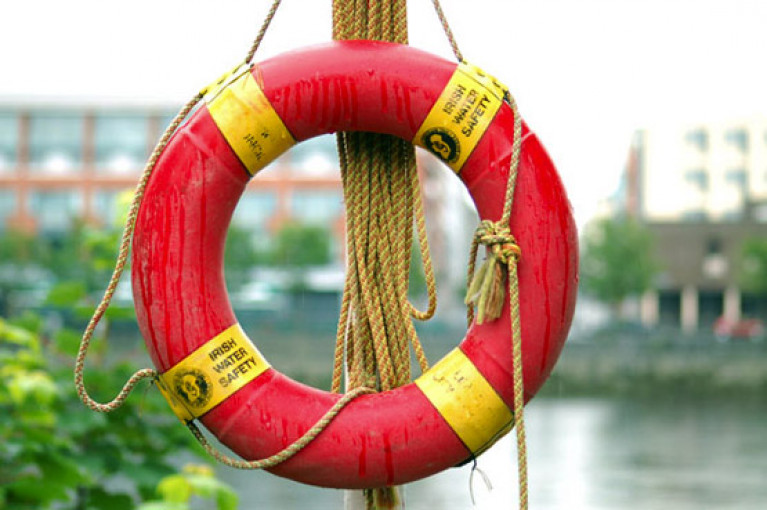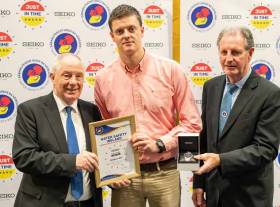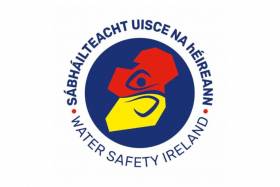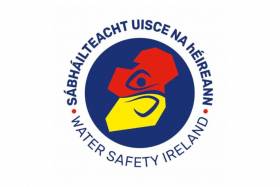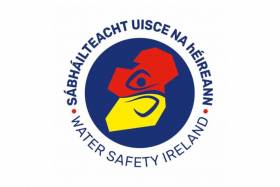Displaying items by tag: Water Safety Ireland
Joint Appeal for Public to Enjoy Cork County Coast Safely
Cork County Council has joined the Irish Coast Guard and Water Safety Ireland in appealing to members of the public to be mindful of their personal safety if they’re visiting the coast this week.
The three organisations have issued guidelines for anyone taking part in coastal walks. They’re asking people to stay away from exposed coastal and cliff edges, tell someone where you’re going and to pay attention to tide times and safety signs.
They’re also advising people to dress appropriately for the conditions, to wear a high-factor sunscreen and to bring enough food and water for their journey.
A status yellow high temperature warning remains in place for the entire country. Met Éireann is predicting maximum temperatures of between 25 and 30 degrees for Co Cork until tomorrow, Friday 23 July.
Mayor of the County of Cork, Cllr Gillian Coughlan said: “We all appreciate the vital work that the council’s beach lifeguards, coastguard and RNLI do on a daily basis, and the last thing anyone wants is to put these vital services under unnecessary strain. By staying informed and prepared, we can help ensure our own safety and the safety of our family members.
“Plan your route carefully and keep an eye on the tide times to avoid being cut off by a tidal cutoff. Keep to the path when enjoying our beautiful coastal walkways; keep dogs on leashes and keep a safe distance from cliff edges, which can be extremely unstable. Cork has an unmatched coastline; let us take advantage of it safely.”
Tim Lucey, chief executive of Cork County Council, added: “Co Cork is home to 19% of the country’s coastline and thousands of people are expected to flock to the seaside to make the most of the good weather. I hope that holiday makers and day trippers will follow these simple guidelines to ensure that they have a safe and enjoyable visit.
“I would also remind visitors to park safely and to ensure that they are not blocking vital access for the emergency services.”
Water Safety Ireland chief executive John Leech highlights the fact that there will be a full moon on Saturday which will bring with it spring tides which increases the risk of stranding.
“Please carry a mobile phone and call 112 and ask for the coastguard if you find yourself in difficulty or being cut off by the tide,” he said.
The Irish Coast Guard’s head of operations Gerard O’Flynn said that the number of incidents coordinated by the coastguard is at a five-year high and he appealed to the public to at all times to be mindful of their personal safety, be it on the water or along the coast.
“Please ensure that any activity you engage in is being monitored by a colleague who should be aware of your plans and estimated return time,” he said.
Cork County Council’s beach lifeguards are on full-time duty from 10.30am until 7pm daily at 12 beaches: Youghal Front Strand, Claycastle, Redbarn, Garryvoe, Fountainstown, Inchydoney East & West, Owenahincha, The Warren, Tragumna, Barleycove Beaches, Garrylucas and Garretstown.
If you see somebody in trouble on the water or along the coast use VHF Channel 16 or Dial 112 and ask for coastguard.
For more information, visit gov.ie/summerready or safetyonthewater.gov.ie
Water Safety Ireland Recruiting for Education Officer
Water Safety Ireland is recruiting for an Education Officer to join the team based in Galway, though the role is currently remote due to COVID-19.
The successful candidate will be responsible for a variety of areas, including assisting with the development and delivery of water safety education and training programmes, workshops and camps to the likes of schools and aquatic facilities.
For more details on this entry level position and to apply online, visit the Water Safety Ireland website HERE.
Risk of Drowning Greater on Lakes & Rivers, Says Water Safety Ireland
In asking the public to remain vigilant near water this Bank holiday weekend, Water Safety Ireland says the risks are even greater at inland waterways. Although 40,000 people live less than 100 metres from the coast and some 2 million people live within 5km of the coast (40% of the population), the majority of drownings, some 62%, actually occur inland at our rivers and lakes.
As people stay home apart from exercising within 5km, Water Safety Ireland is advising the public that to stay SAFE is to “Stay Away From the Edge” if exercising near water this October Bank Holiday and throughout the upcoming mid-term break for schools. Now that people cannot meet up apart from with one other household, the risk of not being rescued if you get into difficulty will increase because there may not be others around to see an accident unfold.
As people are urged to adhere to Government advice at gov.ie/covid19, it is equally important that people adhere to water safety advice during periods of exercise within the Level 5 restrictions, and particularly if a walking regime includes the supervision of children.
WSI is reminding parents and guardians that thirty children died from drowning in ten years. Children are naturally curious about water and constant supervision is the safest way to avoid tragedy. Drownings can occur within the home environments to which we are restricted, where familiarity can breed complacency, making danger more difficult to spot. Streams, drains, ponds, water tanks, septic tanks, slurry pits and waterside fencing should all be properly secured.
- Be aware of the changeable weather at this time of year. Reduced temperatures increase the risk of cold shock and hypothermia which makes swimming to safety difficult or impossible.
- Do not attempt to rescue pets from the water. Earlier this week, a gentleman had a lucky escape after falling from a cliff walk while trying to rescue his dog. In such instances, there may not be anyone around to call the Rescue Services as people comply with the need to stay at home.
- Always wear a Lifejacket when on or near water and ensure that it has a correctly fitted crotch strap. Surfers, kite boarders, divers, kayakers and sailors should wear suitably warm and waterproof clothing.
- Shore walkers should stay away from the edge and remain vigilant to the dangers of being stranded and to being carried away by dangerous swells
- In emergency situations, call 112 early and ask for the Coast Guard.
Discard Your Floating Inflatable Toys Now, Water Safety Ireland Insists
As the official bathing season draws to a close this month, Water Safety Ireland is calling on parents and families to dispose of their inflatable toys.
Earlier this week, Afloat’s Tom MacSweeney interviewed Water Safety Ireland chief John Leech, who explained why such inflatable toys — which often resemble canoes, lilos or cartoon animals, and are not to be confused with towable inflatables — are not suited to Ireland’s unpredictable offshore breezes.
Water Safety Ireland also said it is unfair on rescue services to have to have to respond to avoidable incidents involving these “inflatable killers”, after a summer that saw a rise in callouts involving these toys as families staycationed amid the coronavirus pandemic.
Listen to the John Leech interview on Tom MacSweeney’s latest podcast for Afloat.ie HERE.
Bank Holiday Appeal For Beachgoers To Social Distance & Swim Only Where Lifeguards Are On Duty
Upon the busiest Bank Holiday weekend of the year, Water Safety Ireland is appealing for people to swim only where lifeguards are present and to adhere to social distancing guidelines at beaches.
Water temperature is approaching its highest for the bathing season (sea water is between 14C and 16C and freshwater is between 16C and 18C) so people should encourage their friends and family to join them for an open water swim, as it benefits both physical and mental health.
But care must always be taken, too. In 2019, 105 people drowned in Ireland. And lifeguards administered first aid to 3,284 people last season, highlighting the need for personal responsibility. They also located 289 lost children and rescued 260 casualties from the water nationwide.
The public should be responsible when on or near water, have a healthy respect for the dangers and ensure that all activities are safe and within one’s ability. Novice and beginners must always swim within their depth — and stay within their depth.
Beware of rip currents on all surfing beaches or those with a steep gradient. These can quickly take a person away from shore which is helpful to the surfer but can cause tragedy for those who do not understand such currents.
Lifeguards are trained to spot these currents and keep people away from danger. Should you find yourself in one, then swim parallel to the shore until you leave it, then swim back ashore.
Stranding will also be a risk for many coastal walkers, therefore a mobile phone should be carried to call 112 in an emergency and ask for the coastguard.
Parents should provide constant uninterrupted supervision, as 30 children aged 14 and under drowned within the last 10 years. Never use inflatable toys in open water as they can quickly be swept out to sea by offshore winds and currents.
Alcohol should be avoided before or during any aquatic activity. Alcohol is a factor in an average of three of every 10 drownings.
Those going afloat should always wear a lifejacket and carry a portable Marine VHF and/or a personal locator beacon.
The newly updated Safety on the Water website provides a one-stop shop for this and all other marine safety information. Afloat.ie has more HERE.
Water Safety Ireland has warned that children are at greater risk of drowning during the current period of Covid-19 restrictions.
The organisation points out that over half a million primary school-age children are confined to an area within 2km of their home.
And in many cases, any number of streams, rivers, canals, ponds, slurry and rainwater collection tanks, bog holes, wells, lakes and the seashore can be found within this distance.
“From our research, six out of 10 drownings occur at inland water sites and eight out of 10 drownings occur close to the victim’s home,” Water Safety Ireland says.
“It is essential that parents maintain constant, responsible and uninterrupted supervision on their children to ensure they don’t gain access to these real hazards.”
The water safety charity added that while children are at home, families can take the opportunity to teach them how to stay safe near water by using the free resources available online from the PAWS (Primary Aquatics Water Safety) programme.
In an emergency, call 112 and ask for the coastguard.
Water Safety Ireland Honours Remarkable Rescuers In National Awards
Seventeen lives were saved from drowning by rescuers who will receive recognition at Water Safety Ireland’s National Annual Awards Ceremony at the O’Reilly Hall in UCD this afternoon (Tuesday 26 November).
Michael Ring, Minister for Rural & Community Development, will present the Seiko Just in Time Rescue Award to the rescuers in appreciation for saving so many lives.
“It is an honour to pay tribute to these deserving award recipients”, commented Minister Ring. “Without their bravery, quick thinking and selflessness, the outcomes could have been very different.
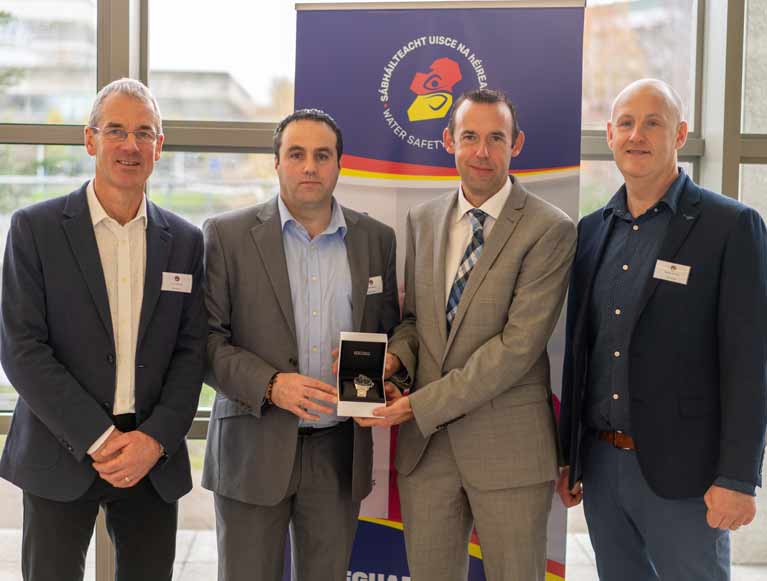 Cyril McKeon, Damien McCabe and Paul Gilmartin – Leitrim On the 6th of May 2018, a training session almost resulted in disaster for a prospective marathon runner. While preparing for an upcoming event, the man fell into the canal at Blueway Waterway. Luckily, Cyril McKeon, Damien McCabe and Paul Gilmartin were on hand as they too were training along the canal. After hearing a splash in the water all three raced to the gentleman’s assistance. The men performed CPR and made sure ambulance personnel were called to the scene
Cyril McKeon, Damien McCabe and Paul Gilmartin – Leitrim On the 6th of May 2018, a training session almost resulted in disaster for a prospective marathon runner. While preparing for an upcoming event, the man fell into the canal at Blueway Waterway. Luckily, Cyril McKeon, Damien McCabe and Paul Gilmartin were on hand as they too were training along the canal. After hearing a splash in the water all three raced to the gentleman’s assistance. The men performed CPR and made sure ambulance personnel were called to the scene
“On average 124 people drown annually in Ireland and while one drowning is one too many, the figure would have been higher but for these courageous rescuers.”
Among the Just in Time Award recipients this year is Dr Matthew Sims, who rushed into the water with a rescue tube to help an adult brother and sister caught in a rip current at Tramore beach on 5 August this year.
Speaking to RTÉ’s News at One earlier today, Dr Sims said he was “just glad he was able to help”.
Others recognised this year include surfer Tom Green from Co Clare, who two months ago broke from the heats of his surfing competition to help two swimmers struggling in the water nearby; kayaker Tom Upritchard, who rescued his own father after he went overboard at Craigavon Watersport Centre on 15 August; and gardaí stationed in Dublin, Donegal and Kilkenny for various quick-thinking efforts.
Recipients also include 61 volunteers who will be presented with Long-Service Volunteer Awards, recognising a combined total of 1,275 years of personal service teaching swimming, water rescue and survival skills in communities nationwide.
“I would like to commend the efforts of Water Safety Ireland volunteers who devote their time and contribute to the year on year trend of reduced drownings”, Minister Ring added.
“The lifeguard service is also crucial to safety on our waterways and would not be possible without the teaching and assessment conducted by Water Safety Ireland Volunteers nationwide.
“This summer, lifeguards rescued 260 people from drowning, administered first aid on 3, 284 occasions and reunited with loved ones 289 lost children found wandering unsupervised near water.”
“I would ask all adults to make themselves more aware of the dangers of drowning,” said Martin O’Sullivan, chairman of Water Safety Ireland.
“Tragedy can strike in seconds but with the right knowledge, skills and attitudes everyone can avoid the hazards and take responsibility for their own safety.
“Encourage your family, friends and colleagues to read Water Safety Ireland’s guidelines at watersafety.ie so that they can enjoy Ireland’s waterways safely.”
Water Safety Ireland is warning that the risk of drownings is higher over the coming bank holiday due to cooler waters, wind chill and particularly high tides due to a new moon.
Stranding will also be a risk for many walkers as lower tides will expose even greater areas of the coastline.
Although Ireland has had no accidental drownings during any bank holiday weekend this year, water-related tragedies can happen in seconds.
And with an average total of 124 drownings every year, Water Safety Ireland is drawing attention to the dangers that will put people’s lives at risk.
The new moon will cause strong rip currents that can quickly take a person away from shore. Survival time in such scenarios is greatly reduced due to the cooler water temperatures and wind chill factor.
Those going afloat should always wear a lifejacket and carry a portable Marine VHF and/or a personal locator beacon.
- Shore walkers should stay away from edge; beach walkers risk being stranded by incoming tides and should always carry a mobile phone.
- Wear a lifejacket when on or near water and ensure that it has a correctly fitting crotch strap.
- Anglers should be extremely vigilant to new moon tides when fishing from the shoreline of Atlantic swells.
- Surfers, divers, kayakers and sailors should wear suitably warm and waterproof clothing.
- Ensure that you are fully trained and competent for your aquatic activity.
- Alcohol should be avoided before or during any aquatic activity.
- In emergency situations, call 112 and ask for the coastguard.
Water Safety Ireland has swimming, lifesaving, water survival and rescue classes nationwide. For further information visit www.watersafety.ie
Water Safety Ireland Launches Consultation On Regulatory Guidelines Following Tragic Drowning Incident
Water Safety Ireland is seeking the views of the public on a draft regulatory framework for aquatic leisure facilities in Ireland.
Following the inquest on 29 March 2017 into the tragic fatal drowning of Ronan Kennedy at the Red Barn Quality Hotel in Youghal on 14 July 2015, the Dublin Coroner made two crucial recommendations to former Minister for Housing, Planning, Community & Local Government, Simon Coveney:
- That there should be a dedicated lifeguard on duty at all times at swimming pools and that the lifeguard should not be a person engaged in other supervisory duties; and
- To recommend to the relevant minister that a dedicated water safety inspectorate is required to formulate regulations and ensure their implementation.
Minister Coveney tasked Water Safety Ireland to review best practice in other European countries with a view to informing the development of an appropriate regulatory framework for Ireland.
Water Safety Ireland says it believes this can be a legacy that will turn this tragic drowning in to a positive regulatory framework that will help prevent similar tragedies in the future, to be known as ‘Ronan’s Regulations’.
Details of the public consultation are available on the Water Safety Ireland website HERE.
Water Safety Warning For June Bank Holiday Weekend
Water Safety Ireland (formerly Irish Water Safety) is appealing for people to swim at lifeguarded waterways this weekend where possible, as the risk of drownings is higher due to a new moon and cool waters.
The new moon will cause strong rip currents that can quickly take a person away from shore.
Survival time in such scenarios is also greatly reduced due to the cooler water temperatures that have not yet warmed up sufficiently for extended swims.
Lifeguards are trained to spot these currents and keep people away from danger.
The lifeguard season begins this weekend and there are many reasons to swim under their supervision.
Lifeguards administered first aid over 4,000 times last year. They located 300 lost children and rescued more than 300 people nationwide.
Stranding will also be a risk for many walkers as lower tides will expose even greater areas of the coastline. Walkers should always carry a mobile phone to call 112 in an emergency.
Parents should provide constant uninterrupted supervision as 30 children aged 14 and under drowned in the 10 years to 2018.
Those going afloat should always wear a lifejacket and carry a portable marine VHF and/or a personal locator beacon.
If you have not used your lifejacket or buoyancy aid since last year, then you will need to carry out the following checks:
- Ensure CO2 cartridges have not been punctured and are firmly secured.
- Ensure all zips, buckles, fasteners and webbing straps are functioning correctly.
- Check that fitted lights are operating correctly.
- Check that the valve or lifejacket is not leaking by inflating the lifejacket overnight or immersing it in water checking for air bubbles.
- Always use your crotch strap when fitting your lifejacket.
- Discard any faulty lifejackets by destroying them.
Detailed information on lifejackets and personal flotation devices (PFDs) is available on the Water Safety Ireland website.



























